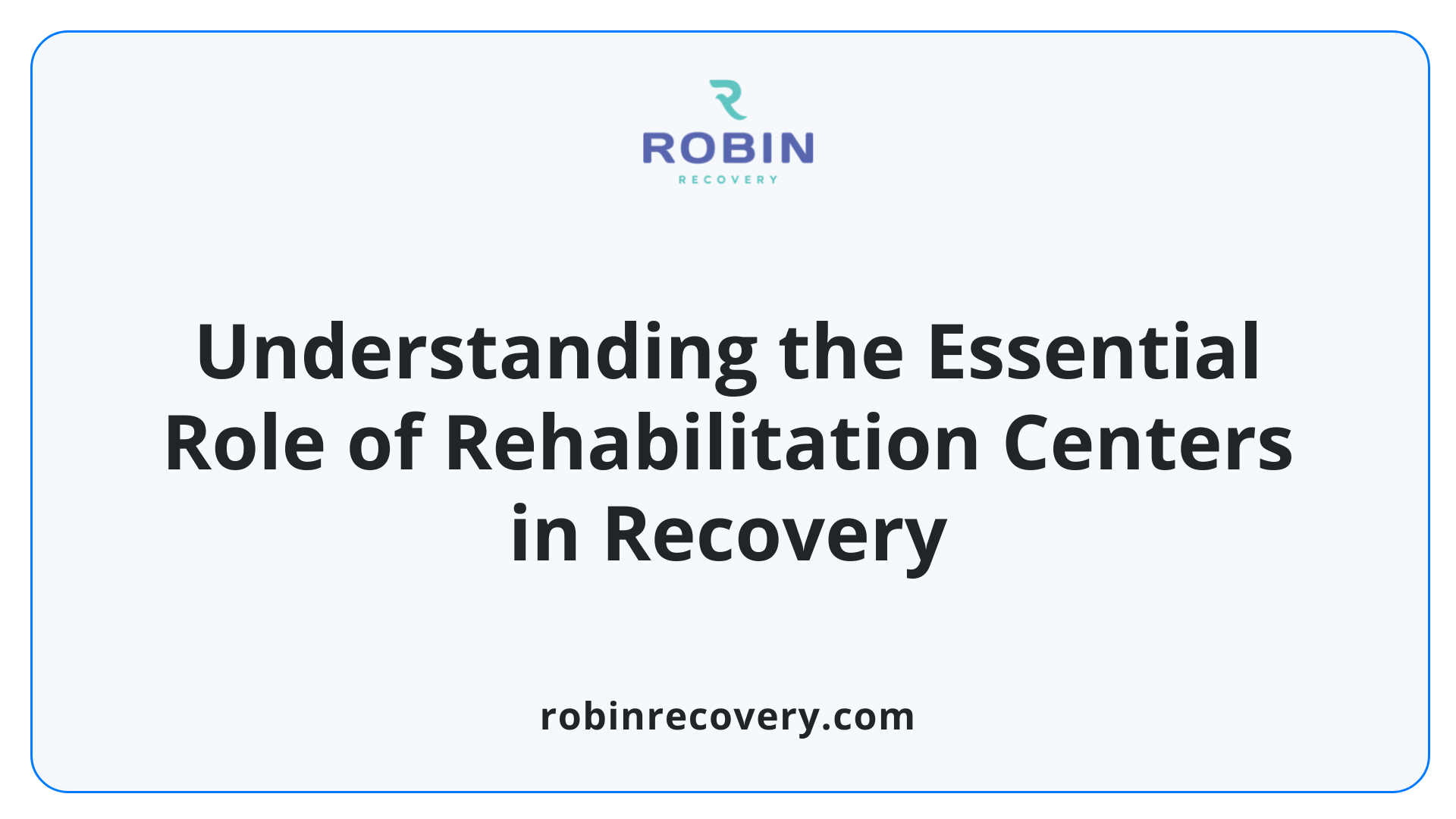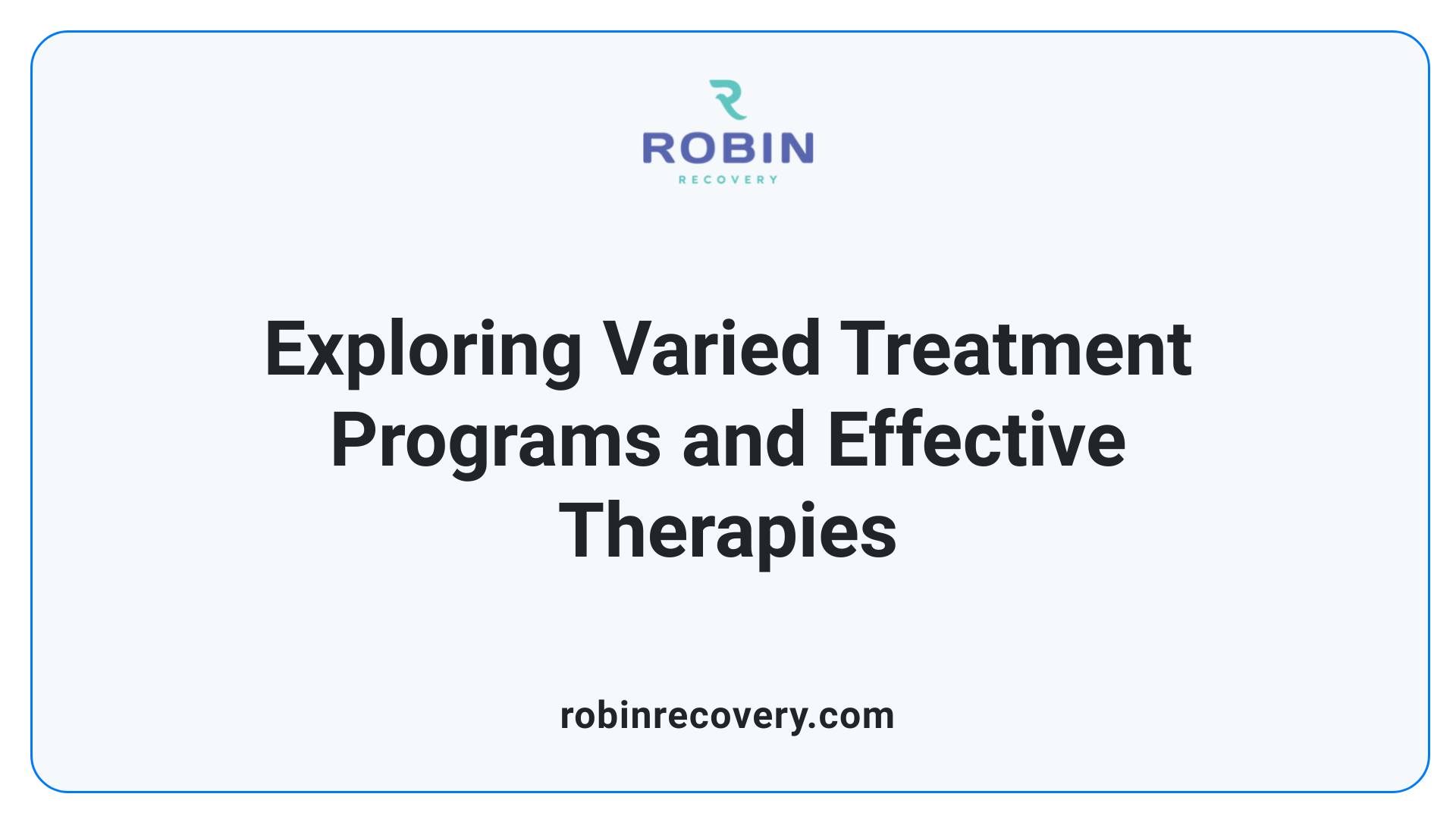How Drug Rehabilitation Centers Assist Recovery

Understanding Drug Rehabilitation
Drug rehabilitation centers are essential in assisting individuals to overcome addiction and achieve long-term recovery. These centers offer a structured environment with professional care, a variety of treatment methodologies, and a robust support system designed to cater to individual needs. This article aims to explore the multifaceted approach these centers take to guide individuals through the recovery process.
The Role of Rehabilitation Centers

What is the goal of a rehabilitation center?
The primary goal of a rehabilitation center is to aid individuals in overcoming addiction and regaining control over their lives. These facilities focus on restoring essential abilities related to daily functioning, including physical, emotional, and cognitive skills. Rehabilitation is crucial for those who have experienced significant setbacks due to substance use, helping them regain independence and a sense of normalcy.
Rehabilitation centers aim to create personalized treatment plans, tailored to each individual’s specific needs. This is accomplished through a collaborative approach involving a team of healthcare providers who specialize in various fields, including therapy and counseling.
Importance in the recovery process
Rehabilitation centers play a pivotal role in the recovery journey, helping individuals manage not only their substance use but also the accompanying medical, mental, and social challenges. Here’s why they are essential:
- Structured Environment: Centers provide a distraction-free and structured setting that minimizes stress, promotes routine, and fosters recovery.
- 24/7 Support: Inpatient programs offer around-the-clock care, which is beneficial for those with severe addiction or co-occurring mental health disorders.
- Integration of Treatments: Treatment plans often include a variety of therapies, from traditional approaches like Cognitive Behavioral Therapy to holistic methods, all addressing multiple aspects of recovery.
Elements of care provided
Rehabilitation facilities encompass various elements of care crucial for effective treatment. Common services include:
- Medical Detoxification: Safely managing withdrawal symptoms under medical supervision.
- Therapeutic Activities: Individual and group therapy sessions, family consultations, and skills training.
- Aftercare Services: Ongoing support post-rehabilitation, including access to support groups and continued counseling to maintain sobriety.
In the context of addiction, rehabilitation centers are vital for enabling individuals to rebuild their lives, equipping them with skills and support systems necessary for sustainable recovery.
How Drug Rehabilitation Works

Stages of Rehabilitation
Rehabilitation for drug addicts unfolds in a structured, multi-step process that guides individuals toward lasting sobriety. This journey typically follows four main stages:
- Intake and Assessment: During this initial phase, treatment providers gather essential information about the individual's medical history, substance use patterns, and support systems. This helps to create a personalized treatment plan.
- Detoxification: For those physically dependent on substances, medically supervised detoxification is crucial. It allows the safe removal of drugs from the body and manages withdrawal symptoms, setting the stage for effective treatment.
- Therapy and Counseling: After detox, individuals engage in therapy aimed at addressing the emotional and social dimensions of addiction. Techniques may include cognitive-behavioral therapy (CBT) and group sessions that enhance understanding and provide support.
- Aftercare and Support: This final stage emphasizes the importance of maintaining sobriety after rehab. Aftercare services often involve ongoing counseling, support groups, and relapse prevention strategies.
Process Overview
How does rehab for drug addicts work? The rehabilitation process is designed to foster comprehensive recovery. After intake and assessment, each individual's treatment is tailored to their unique needs. Success hinges on several factors, including commitment to the program, the type of treatment received, and continued support from aftercare services.
Long-term Recovery Strategies
Effective long-term recovery strategies integrate both therapeutic and support components. Aftercare planning begins right from admission and may include participation in sober living environments, support networks, and ongoing therapy sessions. These resources help individuals navigate challenges and reduce the risk of relapse as they reintegrate into daily life.
Treatment Programs and Therapies

What types of programs and therapies are available at drug rehabilitation centers?
Drug rehabilitation centers provide a spectrum of treatment programs and therapies tailored to address substance dependency. Below are some common options:
Types of Treatment Programs
- Inpatient Rehabilitation: Offers a structured environment with 24/7 supervision, ideal for individuals facing severe addiction or co-occurring mental health disorders. Programs typically last 30 days to 12 months, creating a supportive atmosphere for recovery.
- Outpatient Rehabilitation: Allows individuals to live at home while attending structured therapy sessions, suitable for those with less severe addiction or following inpatient treatment.
- Partial Hospitalization Programs (PHP): Provide intensive treatment during the day, allowing individuals to return home at night, blending elements of inpatient and outpatient care.
- Sober Living Homes: Serve as a transitional space for individuals completing rehabilitation, emphasizing a drug-free lifestyle in a community setting.
Therapies Offered
- Cognitive Behavioral Therapy (CBT): Helps modify harmful thought patterns, teaching coping strategies to manage triggers and cravings.
- Motivational Interviewing: Strengthens an individual’s motivation for change by exploring personal values and reasons for recovery.
- Group Therapy: Enhances peer support and community through shared experiences among participants, fostering a sense of belonging.
- Family Therapy: Addresses the impact of addiction on family dynamics, improving communication and support systems.
Customization and Flexibility
Treatment programs are highly customizable. Rehabilitation centers consider personal factors such as age, gender, specific substance use history, and co-occurring conditions when developing personalized recovery plans. Ongoing monitoring allows for adjustments to treatment strategies as individuals progress in their recovery journey, emphasizing the importance of flexibility in achieving lasting sobriety.
Inside the Daily Routine of Rehab Centers

What is the structure and daily routine within drug rehabilitation programs?
Drug rehabilitation programs typically have a structured daily routine designed to support recovery. This structure minimizes stress and fosters a positive environment conducive to healing.
Mornings often begin with a nutritious breakfast, preparing participants for the day ahead. Following the meal, group therapy sessions are held, where clients share their experiences and offer mutual support. These sessions create a sense of camaraderie essential for recovery.
Throughout the day, individuals participate in a variety of activities:
- Personal Therapy: Engaging in cognitive-behavioral therapy (CBT) or motivational interviewing helps clients address personal challenges and triggers that lead to substance use.
- Fitness Activities: Incorporating yoga, meditation, or other physical exercises promotes both mental and physical health.
- Educational Classes: Participants gain knowledge about addiction, coping mechanisms, and skills to enhance their recovery journey.
- Creative Therapies: Art and music therapy provide avenues for self-expression, helping clients explore emotions and improve self-esteem.
Evenings generally include 12-step meetings such as AA or NA, reinforcing community and support.
This routine not only keeps clients engaged but also equips them with tools and strategies to navigate challenges during and after treatment, ultimately steering them toward long-term sobriety.
Importance of Aftercare and Ongoing Support

How important is aftercare in the recovery process?
Aftercare is a critical component in the recovery process, providing ongoing support and treatment after initial rehabilitation. Given that relapse rates for addictions can range from 40% to 95% within the first year, effective aftercare can significantly reduce this likelihood by up to 80%.
Role of aftercare
Aftercare plans are designed to assist individuals in managing triggers and maintaining sobriety post-rehab. These plans often include:
- Regular therapy sessions: Providing a chance for individuals to address ongoing challenges in their recovery journey.
- Support groups: Fostering community and shared experiences that reinforce the individual’s commitment to sobriety.
- Tailored programs: Addressing specific needs, whether they are mental health issues, vocational training, or social reintegration.
Success in long-term recovery
The success of long-term recovery is closely linked to the strength and engagement in aftercare programs. Individuals who participate in comprehensive aftercare are better equipped to:
- Manage daily stressors that can trigger cravings or the urge to relapse.
- Develop coping strategies to handle life's challenges without resorting to substances.
Elements of ongoing support
Ongoing support encompasses:
- Family counseling: Involving family members to improve communication and understanding regarding addiction dynamics.
- Continued education and skills training: Helping individuals prepare for the workforce and daily responsibilities—essential for achieving a fulfilling life without substances.
In summary, continuing care is essential for sustaining progress and achieving long-term recovery success. By addressing psychological, vocational, and social needs, aftercare programs significantly enhance the chances of maintaining sobriety for individuals once they leave treatment.
Individualized Care and Support Systems
Why is individualized care and support important in rehab?
Individualized care and support are crucial in rehab because each person struggling with addiction has unique challenges and needs that must be addressed for effective treatment. A tailored approach to care considers an individual's medical history, substance use patterns, and accompanying psychological conditions, leading to a more effective recovery plan.
Research indicates that a one-size-fits-all method falls short in addressing the complexities of addiction. Personalized treatment fosters greater engagement, enhances motivation, and promotes accountability among clients. For instance, some individuals might benefit from cognitive-behavioral therapy (CBT), which helps modify unhealthy patterns related to drug use, while others may thrive in group therapy environments that offer peer support and shared experiences.
Moreover, by recognizing the intersection of addiction with mental health disorders, treatment programs can incorporate therapies that address both areas, such as trauma-informed care for those affected by past trauma. This comprehensive approach ensures that as individuals progress, their treatment can adapt to evolving situations.
Ultimately, effective individualized care significantly improves the chances of successful recovery and long-term sobriety by focusing on the root causes and specific triggers of addiction, rather than merely addressing symptoms. The integration of personalized support systems, such as ongoing counseling and family therapy, further enhances a patient’s pathway towards recovery, creating a solid foundation for a healthier future.
Key Components of Individualized CareBenefitsExample Therapies Personalized treatment plans Enhanced engagement Cognitive-Behavioral Therapy (CBT) Ongoing assessment and adjustment Tailored support Group therapy, Family therapy Emphasis on co-occurring conditions Addressing complex needs Holistic approaches (yoga, mindfulness)
Exploring Medical and Holistic Approaches
Combination of therapies
Rehabilitation centers employ a combination of traditional and complementary therapies. Medical treatment typically starts with detoxification to manage withdrawal symptoms, followed by various psychotherapeutic interventions. Commonly used therapies include Cognitive Behavioral Therapy (CBT), family therapy, and group therapy. These methods not only help individuals understand their addiction but also develop coping strategies to manage triggers effectively.
In addition, holistic therapies such as yoga, art therapy, and mindfulness exercises are increasingly integrated into the treatment plans. These approaches aim to engage the individual’s mental and emotional well-being, further supporting recovery.
Holistic treatment philosophy
The holistic treatment philosophy in rehabilitation views addiction as a complex interplay of physical, psychological, and social aspects. By addressing these dimensions, rehab programs can help individuals regain balance in their lives. Holistic approaches focus on improving overall well-being and self-confidence, providing skills that go beyond addiction.
Impact on recovery outcomes
Research indicates that programs incorporating both medical and holistic therapies yield better recovery outcomes. Participants in such programs report lower relapse rates and greater satisfaction with their treatment journeys. The variety of therapeutic options allows for personalized treatment plans, catering to the unique needs of each individual. This adaptability is crucial, as it acknowledges that recovery is not a one-size-fits-all process.
The Effectiveness of Different Rehabilitation Techniques
Success rates
Research shows that successful drug rehabilitation treatments can significantly improve recovery rates. A notable statistic from Turnbridge's Outcomes Study indicates that over 95% of its alumni, who completed at least 270 days in treatment, remained sober for at least one year. This emphasizes the association between the duration of treatment and sustained sobriety.
Impact of techniques
Various rehabilitation techniques contribute to effective recovery, with programming encompassing individualized treatment plans. Techniques like Cognitive Behavioral Therapy (CBT) help individuals change their thought patterns related to drug use, fostering healthier behaviors. Additionally, group therapy creates a supportive community where individuals can share experiences related to addiction, encouraging camaraderie and mutual understanding.
Role in sustained recovery
Integration of holistic approaches aids in addressing multiple facets of recovery, such as physical, emotional, and spiritual well-being. By offering a mix of therapies, including family counseling, art therapy, and mindfulness practices, rehabilitation centers help participants acquire life skills necessary for reintegrating into society. Aftercare programs play a critical role post-rehabilitation, providing ongoing support to prevent relapse, which often reflects the chronic nature of addiction, similar to the recovery processes associated with other chronic diseases.
In summary, effective rehabilitation techniques not only serve to facilitate initial sobriety but also significantly contribute to long-term recovery success through tailored treatment approaches and continuous support.
Navigating the Rehabilitation Journey
Expectations during rehab
During rehabilitation, individuals can expect a highly structured environment focused on recovery. A typical day may include group therapy and individual counseling, as well as wellness activities such as yoga and meditation designed to promote healthy habits. Morning classes often help set a positive tone for the day and assist in developing long-lasting skills.
Guidance and support
The importance of support systems cannot be overstated during recovery. Rehab centers typically provide round-the-clock care, which is critical for those with severe addiction issues or co-occurring disorders. Additionally, peer support groups like Alcoholics Anonymous (AA) and family therapy contribute to a supportive atmosphere. Programs such as those offered by the Salvation Army emphasize holistic well-being, ensuring participants receive emotional, social, and spiritual support.
Learning and adaptation
Rehabilitation is also a learning process, where individuals explore their triggers and develop coping strategies through therapies like Cognitive Behavioral Therapy (CBT). Participants are encouraged to adapt to their new environment and cultivate skills they might have neglected during their addiction. Aftercare planning is another essential aspect, helping individuals maintain their sobriety and reintegrate into daily life upon completion of the program.
Supporting Structures and Community Integration
Role of family and community
Family involvement plays a critical role in the rehabilitation process. Treatment programs often include family therapy sessions aimed at mending relationships affected by addiction. These sessions educate loved ones about addiction and allow family members to engage in the recovery journey, strengthening their support systems. Connecting with loved ones can significantly enhance an individual's recovery experience by fostering understanding and patience.
Participation in group activities
Group therapy is pivotal in rehab settings, providing clients a safe space to share personal experiences related to addiction and recovery. Such environments help participants develop camaraderie and a sense of belonging, which combats feelings of loneliness and isolation. Additionally, engaging in structured group activities keeps individuals occupied, reducing boredom and cravings that might jeopardize their recovery. Activities may include fitness classes, art therapy, or twelve-step meetings, each facilitating peer support and emotional sharing.
Building a post-rehab life
A significant aspect of successful recovery involves planning for life after rehab. Aftercare programs are crucial in this transition, offering assistance in maintaining sobriety and integrating back into daily life. These may include continued therapy, support groups, and sober living homes that create supportive environments for sustained recovery. As individuals prepare to return to their communities, developing strategies for dealing with triggers and stressors becomes essential for fostering a successful post-rehab life.
Focus Area Goals Activities/Involvement Family Involvement Strengthen family ties Family therapy sessions Group Activities Promote camaraderie and support Group therapy, fitness classes, art therapy Post-Rehab Life Plan for continuous recovery Aftercare programs, sober living options
Embracing Recovery Through Structured Support
Drug rehabilitation centers play a crucial role in the recovery journey, offering structured support and a range of therapies tailored to individual needs. By providing a safe environment, engaging treatment programs, and continuous aftercare, these centers guide individuals towards achieving long-term sobriety and improved quality of life. Understanding the nature and scope of these services is vital for anyone considering treatment or supporting a loved one through the process of overcoming addiction.
References
- Drug & Alcohol Rehab: What to Expect In Rehab
- SAMHSA's National Helpline
- What is a Typical Day in Drug Rehab Like? - Addiction Center
- Rehabilitation | The Salvation Army USA
- Types of Rehab for Drug and Alcohol Addiction
- How Does Drug Rehab Work? - Turnbridge
- Treatment and Recovery | National Institute on Drug Abuse (NIDA)
- Understanding addiction treatment: How does drug rehab work?
